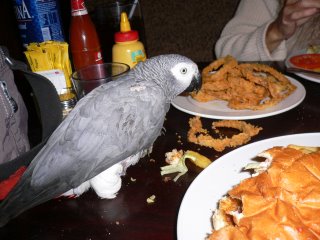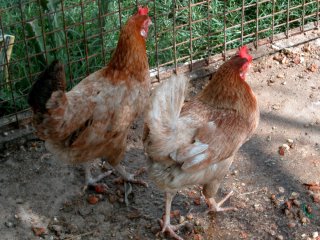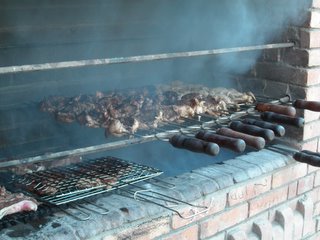It's been an interesting week, to say the least. I had a mare who had to go in for surgery on a check ligament, and since she doesn't approve of riding in trucks or trailers, I had to walk her over to the stud farm where the surgery was going to be done. The day of the surgery one of my parrots lost a foot. How or to whom is still unknown, and as I didn't get home until long after dark in the middle of a rainstorm, I didn't know what had happened until the next morning. The mare is recovering nicely and the parrot is currently inhabiting an indoor cage where she gets a lot of cuddling and almonds while she learns to move around with only one foot. If it had been me, I'd have been a goner long before morning, but parrots are amazingly resilient.

When friends messaged me on the phone that bird flu had been found in Egypt, it was one of those "And what else can happen?" moments. I'll be honest. I haven't decided what to do about my three chickens. They live isolated from people other than myself when I feed the parrots, so I suspect that they are a limited risk to everyone except the parrots who share their cage at this point. Other chickens haven't been so lucky. Most families in the rural areas keep ducks, chickens, geese, and turkeys. Many of these families have been slaughtering their chickens in cooperation with the government edict that states there is a major fine for owning poultry if you are not a poultry farm.

The countryside is dotted with long two and three storey buildings that usually house hundreds of thousands of chickens. These chicken factories, as we call them, supply most of the protein for the people of Egypt. There is no grazing land, so cattle farming isn't really feasible. The Mediterranean is not the healthiest ocean, so fishing isn't going to be able to pick up the slack. Neighbours told me today that a number of these places have culled their entire flocks. They can't sell the birds even if they are completely healthy and they don't want to risk finding the virus among the birds. On one side, the willingness of the people to sacrifice for the greater good is pretty amazing, on the other, I worry about the economic effects on the people. More wealthy Egyptians will simply switch to meat or fish for their protein. The poor do not have that option. There seems to be a local assumption that the virus will go away with the hot weather, but somehow I don't believe so. And what these families will do to help feed themselves is yet to be seen. The market poultry raisers are taking severe blows, since one can be sure that there is no insurance to help to cover the cost of losing all of these chickens.

I understand the wish of governments to safeguard their populations from disease, but somehow it seems to me that part of all the orders to rid Egypt of backyard raising of poultry is the assumption that somehow we humans actually can control our environment. Avian viruses are not something new. They've been here forever, but now humans know how to identify and study them, although obviously we don't know how to control their spread. And they are not going to go away, either. So is the solution simply to ban the existence of birds in households or at least out of doors? Or is it to show people how to keep their birds as free of disease as possible? Can families who depend on being able to raise their own protein in the form of poultry be expected to never have any chickens or ducks again? Even if they killed every bird in Egypt, six months down the line any new birds would still be at risk of disease. There has to be a reasonable solution to this, but I'm certainly not sure what it would be.